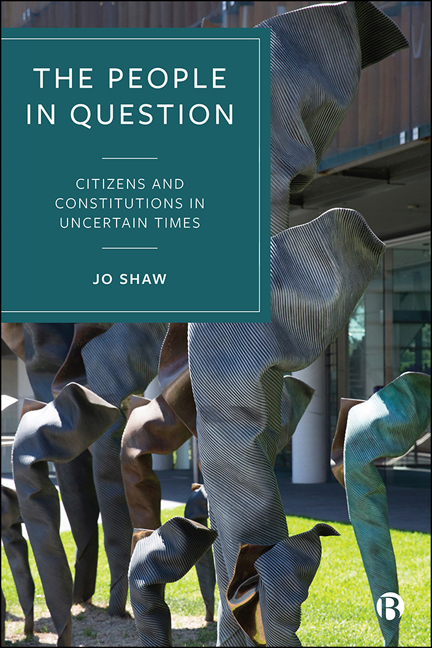3 - Picking out the People: Ideals and Identities in the Citizenship/Constitution Relation
Published online by Cambridge University Press: 18 March 2021
Summary
Introduction
The idea of constitutional citizenship demonstrates how a concept of membership can ‘sit’ within state polities, all of which possess some form of written or unwritten, documentary or dispersed, constitution, constitutional law and constitutional principles. Since constitutions often articulate the distinctive ‘ideals’ of the state, this seems to be a good starting point for a mapping of how citizenship and constitutions/constitutional law interact. To do this, we need to prise open the idea of constitutional citizenship, using associated concepts within constitutional and political theory, such as the people, the ‘demos’, constituent power, popular sovereignty, allegiance and loyalty to the state, constitutional identity, equality and dignity. That is the task of this chapter.
Woven through the notes that follow are many examples exploring what constitutional citizenship looks like in the specific circumstances of different constitutional frameworks. The conceptual discussions and exemplary case studies are closely linked in so far as the examples help us to understand how the concepts are evolving. Material is drawn from beyond the canon of liberal and democratic constitutionalism. The proliferation of studies of populist constitutionalism, of authoritarian constitutionalism, and of constitutions and constitutionalism in illiberal polities demands a response in terms of thinking about the role and character of constitutional citizenship in such contexts. In illiberal, or semi-liberal polities, the ‘state is expressly not neutral, privileging a substantive vision of the good, informed by ethnicity, religion or communal morality’ (Thio 2012, 136). We will also discuss a number of examples of illiberal constitutionalism in Chapter 6 from the perspective of populism.
There are certainly challenges and risks involved in opening up the field of enquiry in this way. Looking at constitutions and constitutional law in isolation can give a distorted picture of reality. For instance, the Soviet-era constitutions of the states behind the Iron Curtain were full of references to citizens, democracy and various freedoms, but the reality, because they were one-party states, was quite different (Herzog 2012). Even while transition is underway, a constitution can claim to be ‘democratic’ but not live up to the claim. This was the case with the Constitution of the Federal Republic of Yugoslavia (FRY) (the territorially reduced and short-lived [1992–2003] successor to the Socialist Federal Republic of Yugoslavia [SFRY]), which contained multiple references to democracy, freedoms and the rule of law
- Type
- Chapter
- Information
- The People in QuestionCitizens and Constitutions in Uncertain Times, pp. 63 - 98Publisher: Bristol University PressPrint publication year: 2020



